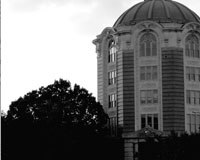
On Bruce's Office
For Lucretius
Quotidian
Eileen's Root Canal
For Bruce Hoffman
Guru Meher Baba, like a corpulent uncle,
smiles down from his colorized glassed
photo over the desk, pink leis looped around
the frame;
below that, to the left, at child's
eye-level, St. Francis' prayer partially illuminated,
a medieval manuscript under glass, the incessant motif
of giving, of loving, of dying,
so unextenuated
that one looks away as from the man at Grand
Central Station who talks about seeing god.
Lying flat, face up, weighed down by a red stuffed
elephant, a two-year-old photo of Bruce reading
beneath a portrait of Meher Baba that is even larger
than the blown-up photo over the abandoned desk,
and in a corner of that room, Bruce's mother, dressed
in white, as if retreating from the Indian sun somewhere
outside Mumbai,
mother like an intermediate stage
of avatar caught between Bruce and Baba,
and Bruce's glasses nakedly here, lenses gleaming,
where he'd rested between Freshman themes,
tired of greed, weary of fear, cloyed with belonging,
looking out his window at the blurred row of hemlocks
separating the Veterans' cemetery from the campus,
thinking he saw Woody's grave, Jack O'Connor's grave,
colleagues fallen from an excess of heart.
And on the opposite shelf a porcelain tankard
with "Bruce" gilded on it, and down toward the door,
on a lower shelf, the coffee mug with "Bruce" glazed over
like Chinese brush strokes made permanent in a kiln,
and the commemorative plate with a steeple in a village,
the plaster spurious Hummel of a man leaning over his dog,
bric-a-brac, tchatchkas, cheap railway souvenirs,
who would leave such junk in his office,
grinning and shrugging while a virus diluted his voice,
who would see through his spotted skin
the middle eye opening like a clear vista
in the Himalayas,
who would gather into his spindly legs
the gait of Gandhi, his robe tightened
around such hunger no one believed he had anything
in reserve
as the indigent, gawking spirit
just gaped there with its mouth open
reading St. Francis’ prayer..
It is in the highest degree
unlikely that this earth and sky is the
only one to have been created.
What is the lesson of compound leaves, catclaw
and sumac? To tremble opposite in rain,
shedding small darkness. What white blossoms gnaw
the mind? Clouds of vibernum. Ask again.
What are these fallen generations? Buckeye
and hickory. Midnight's acorn. Blank harvest
of the moon. What harms a man beneath this tree?
His emptiness. What scent is this? Ash. Locust.
What mood severs softness from bone, what will harden
fire? The brain's lightning. Earth's enmity.
What water wears through wood? Fear. What is given
root? Blood. What ruptures into seed? Voice. What sky
torments speech? What is your name? What bursts the heart?
What is your name? Why do I kneel, holding my heart?
What evidence, this heat: 95 degrees, the dog scratching, chomping her haunch. Ozone creeping up from the city, old lungs wheezing, a yellow rectangle of grass forming over the septic tank. Our old cat fattening up, her thyroid slowed down by tapezole. All these threads, like the spider web hung between the blue spruce and sibling spruce, visible and wet at dawn. The raw day breaking up sleep and sluggish dream, its formed emptiness undone by lists: flea-dip the dog, pill the cat, cut-grass the lawn, upleap this melancholy, cool-drink words. Where specificity fails: coffee like sludge, the arc of the eye’s whiteness just so many degrees out of round. The latest death, who could save? Death intoxicant. Death redivivus. Death fuck. A child running from the edge of a lake, crying, trenching the white sand, his mother asking, What? What? Once, my brother, the boy running along Rockaway Beach: What? What? Years later the drug fuel he poured over himself, in himself, the lit match of his anger grinning. Did you? Did you? The day’s temperature already unbearable. UPS truck chased by the dog. The cat oozing from her right eye, lachrymatory ash. Farewell, brother. Farewell.
Dr. Cohn’s/root/canal/office in rear of quasi-Aztec bunker. E goes in, disappears behind glass partition, white uniforms, smiling women, dentist’s basso voice, $50,000 BMW. I’m reading People magazine. Teeth, teeth, teeth. Swimming pools. Ads for the Caribbean. Air-conditioning so cold: where in the Virgin Islands: huge hibiscus, rose-colored parchment trumpets, pollen-laden stamens, hyphenated-peeled-back-foreskins: burned odor of tooth enamel triturated by Cohn’s drill: where beneath galvanized tin roofs, Johnny cakes and Vi’s chicken, all cats on that island the same narrow Abyssinians, as if one and one only; imported mongooses diurnal and wrong for nocturnal rodents: wild donkeys who once carried sugar cane down volcanic slopes: me, sweating and giddy on forest trail to Reef Bay Sugar Plantation, E saying, “Get out of the sun!” I should be in there holding a parasol over her, blocking Cohn’s death ray, the garish yellow/green on her face, the miniscule canal and empty tunnel of her tooth’s nerve: “There it is! There, there!” The land crab disappearing into its hole, a tarantula, and all the signs saying you can keep the coconuts that fall from trees but please dispose of the shells: Pang. Pang. Bam. You could be knocked unconscious. You could have your skull split. You could open your mouth and feel nothing at all.
John Allman is the author of Lowcountry published by New Directions in 2007. Other books by Allman include Loew's Triboro (2004), Curve Away from Stillness (1989), Scenarios for a Mixed Landscape (1986), and Clio's Children (1985), all from New Directions; Inhabited World: New & Selected Poems 1970-1995 (The Wallace Stevens Society Press, 1995); and Walking Four Ways in the Wind (Princeton, 1979). His new collection of prose poems, Algorithms, will be published by Quale Press this October.

